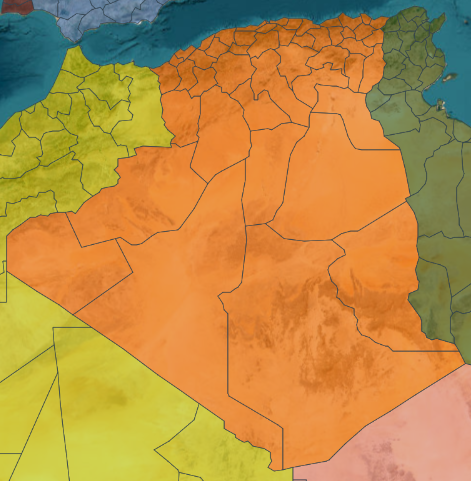Algeria
The Emirate of Algeria was a theocratic nation in North Africa that bordered Morocco, Italian Libya, and the regions of the German African Colonial Empire.
Culture
The culture of Algeria was heavily influenced by Sunni Islam and the teachings of Abdelkader. The government was largely made up of Sufi priests and elders. This was including the judicial system, which in part sought to uphold Sharia Law. Men and women alike are encouraged to dress modestly, and even the currency bears the name of the Prophet Muhammad.
Abdelkader had been greatly influenced by his drive for knowledge, and this carried in his decree to preserve books of all kinds. Though his collection was largely destroyed or confiscated by his imprisonment, he began anew upon his return. To this day, the Library of Tagdemt is heralded as a great cultural center for learning.
History
With the onset of the French Civil War, Abdelkader al Jaza'iri was held as a political prisoner with his family in France. In 1852, with the help of his guards, Abdelkader escaped France and returned to Algeria. It was there that he declared the peace agreement between himself and France was voided by his imprisonment as opposed to the promise exile, and thus resumed his jihad. He was once again elected as Emir, with the full title of Commander of the Faithful.
Abdelkader successfully drove out the remaining French forces from the region, and turned his attention east to the remaining tribes that had resisted him. Adding to his charisma the capabilities of French generals that had joined him, he was able to finally bring them into the fold.
Abdelkader passed away in 1883. By his decree, the title of Emir of Algeria was once again inherited via election among the Sufi priests and elders.
During the Berlin Conference of 1884 and 1885, Algeria argued to have its borders recognized south into the Sahara Desert.
During the The Great War, the Emir of Algeria agreed to a jihad against the Kingdom of Spain in support of liberating Morocco. With the fall of the Spanish Monarchy, Algeria assisted in Moroccan stability.
Disbandment
During the The Great War, Algeria had been working to assist Morocco against the imperial decree of Spain. The Emir joined the Ottoman sultan in declaring a jihad, though primarily targeted Spain in Morocco after negotiations with Germany. The Algerian army was mostly successful, having benefited from German military attaches. However, Algeria had always had resentment towards the victorious powers over their imperial expansions, as well as Italy cracking down on Libyan and Tunisian nationalists.
With the defeat of Spain and the subsequent independence of Morocco, the Moroccan sultan requested further aid from Algeria, to which Algeria answered. Morocco had inheritted a large mass of land from the Spanish African Colonial Empire, but was having difficulting managing it. With the governments working in tandem and the military overlapping, The Moroccan sultan and the Algerian Emir began negotiations for a union. In 1926, the Sultanate of Maghreb was declared.
Ethics
During his lifetime, Abdelkader ensured the equality of all men under Allah, regardless of faith and nationality. Those taken prisoner by him during the revolution were treated fairlyand hospitably, which in turn saw many of them flock to his side upon his return. During the riots across much of the Arab world, he ordered the protection of Christians being targeted for violence. Though this degree of ethics has waned throughout the duration of the Emirate, Abdelkader's successors have largely held these tenants as fundamental.

"Victory from Allah and reconquest is near", "Nothing is more beneficial than piety and courage"
The Emir is the elected Head of State that serves for life. He is assisted by a Council of Ministers called divan, and advised by a board of majilis, as well as Kalifahs representing the various regions of Algeria and wise ulamas. He is elected from amongst the Ulamas, Khalifahs, or the Majilis.



Comments
Author's Notes
Entry for the March of 31 Tales Challenge hosted by Demongrey
Generic article
| Jun 1, 2025
The March of 31 Tales
A challenge to write an article every day